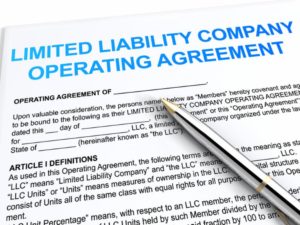Why Having an Operating Agreement is Important for a Florida LLC

Florida does not require Limited Liability Companies (LLC’s) to have an Operating Agreement. So why is it recommended, and important, to have one?
An Operating Agreement is the governing document of an LLC, which sets forth the rules and structure for operating the LLC as well as the relationship among the members and between the members and the LLC, including, for example:
- The LLC’s purpose, general activities, and affairs;
- The rights, duties, and powers of each member;
- The rights, duties, and powers of the manager;
- Any restrictions on the rights and powers of the members, managers, or any officer;
- Procedures for conducting business;
- Funding and profit distributions;
- Procedures for dissociation of members (i.e., how to kick out problematic members);
- Accounting methods and procedures;
- How business decisions are to be made;
- Procedure for handling member disputes;
- Voting;
- Removal of a manager;
- Handling Deadlock;
- Indemnification of Members and Managers;
- Procedure for amending an Operating Agreement;
- Ownership transition; and
- Certain consequences or penalties imposed on a member for failure to comply with the terms, conditions, obligations, or procedures set forth in the operating agreement.
Without an Operating Agreement in place, the LLC will default to being governed by the provisions of Florida’s Revised LLC Act. Of course, these general rules in the Revised Act are not specific to any particular LLC. A well-drafted, customized Operating Agreement for your LLC can provide guidance where the Revised Act may contain gaps or provide generalized rules that may not necessarily work well for your LLC’s business goals, operations, and management. If your Operating Agreement addresses any particular provision covered by the Revised Act, the Operating Agreement will control over the Revised Act’s general default rules. However, even if your LLC has an Operating Agreement, if it is silent on any particular subject matter, then the Revised Act’s default provisions will control. It is therefore critical that your LLC’s Operating Agreement be drafted as comprehensively as possible in order to avoid the default provisions of the Revised Act.
Business disputes are not only common, but nearly inevitable. Having a properly drafted Operating Agreement that defines clear procedures for resolving disputes, including resolving deadlocks, disputes among members or between members and managers, and other potential conflicts, can help avoid expensive, prolonged, and complex litigation.
The broad authority granted in the Revised Act allowing LLC’s craft provisions in Operating Agreements governing the major decisions, daily operational tasks, and overall operation of the LLC is not endless. The Revised Act also imposes certain restrictions on what an Operating Agreement cannot do. This is why it is critical that owners of an LLC consult with experienced Florida business attorneys at the time the LLC is being formed to craft an individually tailored, comprehensive Operating Agreement for your LLC in compliance with Florida LLC law.
The business lawyers at Haber Law have extensive experience serving LLC owners and operators in Florida, and can help draft, negotiate, and review your LLC’s Operating Agreement. We can also litigate membership and LLC disputes that may arise with or without an Operating Agreement. Please contact Haber Law more information or to schedule a consultation.
